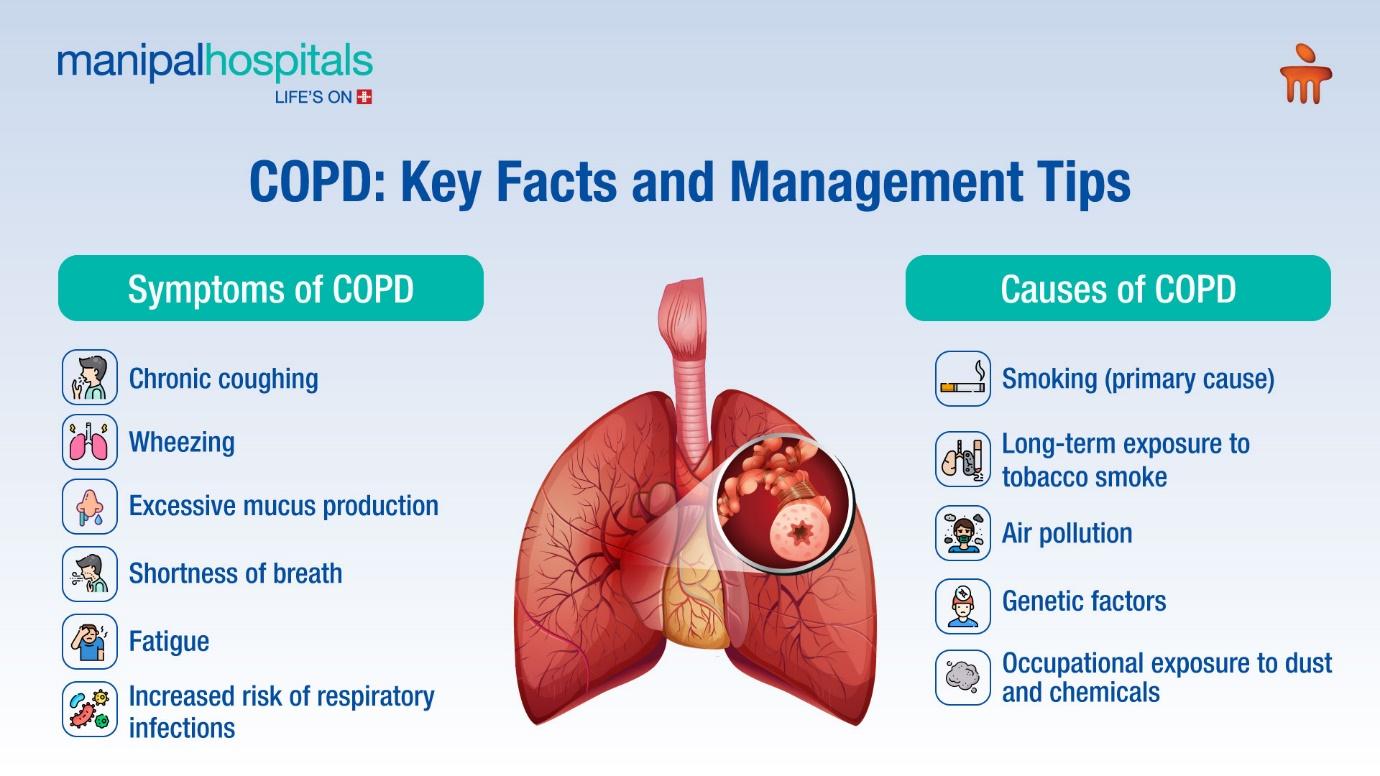
Chronic Obstructive Pulmonary Disease (COPD) describes a group of lung conditions that cause difficulties in breathing due to airflow restrictions. It differs from asthma, as asthma occurs in attacks, while COPD is progressive. COPD manifests in two different types: chronic bronchitis and emphysema.
Chronic bronchitis is when the lining of the bronchial tubes (which carry air to and from the lungs' air sacs or alveoli) is inflamed. The main characteristics of chronic bronchitis are daily coughing and constant mucus (sputum) production. Whereas, emphysema destroys the alveoli at the end of the smallest air passages (bronchioles). This damage occurs due to constant exposure to cigarette smoke, other irritating gasses and particulate matter.
Synopsis

Understanding the Symptoms of COPD
The typical symptoms of COPD include:
- Chronic coughing
- Wheezing
- Excessive phlegm and mucous production
- Shortness of breath
- Lack of energy or malaise
- Frequent respiratory infections due to lesser lung immunity
COPD is chronic and progressive as it worsens over time and age. Although there is no cure for COPD, there are many management and treatment strategies that can slow down the progression of COPD.
What are the Causes of COPD?
Several factors cause COPD such as:
- Long-term exposure to tobacco smoke and smoking
- Air pollution
- Asthma
- Weak lungs
- Exposure to burning fuel fumes
- Genetics (alpha-1 deficiency)
- Occupational exposure to dust and chemicals
However, smoking is one of the primary, if not the leading, COPD causes.
Smoking and COPD
Numerous studies have established a strong link between smoking and COPD. If a person has a consistent smoking habit, they will be at a high risk of developing COPD symptoms. And if a person has COPD, smoking will trigger and exacerbate the symptoms.
When cigarettes burn, they create more than 7,000 chemicals, containing high concentrations of reactive oxidants. These components can induce inflammation in the lungs and airways which leads to damage such as:
- Narrowing of air passages,
- Swelling
- Weakening of the lungs' immunity (increasing susceptibility to infections),
- Hardening of the inner lung lining
- Destruction of air sacs
The sustained inflammation often persists even after quitting smoking, as the local inflammation remains active. Smoking also destroys the tiny cilia hairs in the airways that help keep the lungs clean. Additionally, cigarettes may contain chemicals that allow the lungs' airways to open up, increasing the absorption of harmful substances and toxins.
Simple ways to manage COPD
Despite the sustained inflammation, quitting the habit of smoking reduces the development and risks of COPD. The best way to prevent COPD is not to smoke, and if you smoke, quit. While quitting smoking is tough, seeking behavioural interventions and counselling services, using alternate sources of nicotine and talking to your loved ones can help you be accountable and help manage the withdrawal symptoms. Another strategy is to avoid second-hand smoke from burning tobacco products like cigarettes, cigars, or pipes, and smoke exhaled by smokers.
Smoking is a major cause of COPD, leading to chronic bronchitis and emphysema through sustained inflammation and lung damage. Understanding the link between smoking and COPD highlights the importance of quitting smoking to prevent and manage this debilitating condition. While COPD is progressive and incurable, in COPD, quitting smoking and adopting management strategies can significantly slow its progression and improve quality of life. Taking proactive steps to avoid smoking and exposure to second-hand smoke is crucial for lung health and overall well-being. For more details, you can also visit the Pulmonology Department at Manipal Hospitals, Vijayawada.
FAQ's
A cough, especially upon waking, can be a symptom of COPD, but it's not exclusive. If your cough is persistent and accompanied by shortness of breath or wheezing, consult a doctor for a proper diagnosis.
Smoking is the primary culprit behind COPD, but non-smokers can develop it too. Exposure to secondhand smoke, air pollution, and even a history of respiratory infections can contribute to COPD.
Quitting smoking is the most crucial step. Medications like inhalers help relax airways and reduce inflammation. Pulmonary rehabilitation exercises strengthen your breathing muscles, making daily activities easier.
With proper consultation with your doctor, travel is possible! Pack your medications, research potential pollution levels at your destination, and consider using supplemental oxygen during flights for added comfort.



















 3 Min Read
3 Min Read










.png)





